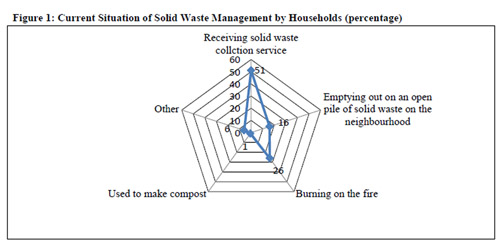Households’ Willingness to Pay for Improved Solid Waste Management in Banepa Municipality, Nepal
Main Article Content
Abstract
Banepa municipality is facing the problem of solid waste management. Lack of financial resources is fueling this problem. This study was designed to estimate households’ willingness to pay for improved solid waste management in Banepa municipality, Nepal. To elicit willingness to pay, singlebounded dichotomous choice contingent valuation method was employed. Study was based on crosssectional survey of randomly selected 220 households. Out of total respondents, 83 percent were willing to pay for improved solid waste management. It was found that 51 percent households were getting solid waste collection service. The mean willingness to pay is Rs 166 (USD 1.69) per household per month whereas median willingness to pay is Rs 160 (USD 1.63). Result reveals that bid amount, age of respondent, sex of the respondent, household size, level of education of respondent, present waste collection service and household income are the factors affecting willingness to pay for improved solid waste management. Currently, municipality is charging Re 1 (USD 0.01) per household per day as garbage fee. Thus, present garbage fee is far below the mean willingness to pay of households. So, there is the opportunity of increasing garbage fee. The mean willingness to pay may be a guide to municipal authorities to determine appropriate garbage fee.
Article Details
How to Cite
Bhattarai, K. (2015). Households’ Willingness to Pay for Improved Solid Waste Management in Banepa Municipality, Nepal. Environment and Natural Resources Journal, 13(2), 14–25. retrieved from https://ph02.tci-thaijo.org/index.php/ennrj/article/view/70294
Section
Original Research Articles
Published articles are under the copyright of the Environment and Natural Resources Journal effective when the article is accepted for publication thus granting Environment and Natural Resources Journal all rights for the work so that both parties may be protected from the consequences of unauthorized use. Partially or totally publication of an article elsewhere is possible only after the consent from the editors.

